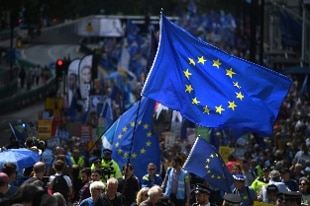- Brexit, Tusk to Johnson: "The 'backstop' is a guarantee until an alternative is found"
- Brexit. Johnson writes to Tusk: yes to agreement, no backstop
- Brexit, signed the law that cancels EU laws in Great Britain
- Infinite Brexit. Johnson wants to renegotiate, the EU rejects and warns: "Risks if you don't pay the bill"
- Boris Johnson: "Brexit on October 31. We will become the largest country on earth"
Share
by Tiziana Di Giovannandrea 20 August 2019The representatives of the United Kingdom will stop participating in most of the meetings of the European Union starting from 1 September, with the exception of what "concerns the national interest". The Department of exit from the European Union announced it in a note.Brexit, as is known, is scheduled for October 31st. The government believes that the time saved will be better spent focusing on Brexit.
British officials and ministers will therefore only participate in EU meetings in which Britain has a significant national interest in the outcome of the discussions, such as security, it specifies in the note of the Department on Brexit. "This decision reflects the fact that the UK's exit from the EU on October 31st is now closer and many of the discussions in the EU meetings will be about the future of the EU after the UK comes out". British officials and ministers will focus "on our future relationship with the European Union and other partners in the world", the statement reads. Representatives of the United Kingdom attending the meetings will have the opportunity to better focus "our immediate national priorities".
London has assured that with this decision "it does not intend to interfere with the functioning of the EU", stating that "the British vote would be delegated in order not to block the ongoing activities of the other 27 members". "From now on we will go to the meetings that really matter, reducing our presence by more than half and gaining hundreds of hours," said Brexit Minister Steve, Barclay. The decision will be made on a case by case basis based on the meeting agenda.
In detail, ministers and officials of the British government will continue to attend meetings where their interests are at stake, in particular the meetings on the exit of the United Kingdom, its sovereignty, international relations, security or finances. Boris Johnson, will continue to attend meetings of the European Council.
Boris Johnson succeeded Theresa May as Prime Minister and said he was ready to leave the EU on October 31 with or without agreement but meanwhile goes to Berlin on Wednesday and Thursday in Paris to meet German Chancellor Angela Merkel and then the president first Frenchman Emmanuel Macron in an attempt to convince them of his vision of Brexit, before the G7 summit in Biarritz (south-west France) on the weekend of 24 to 26 August 2019 where cryptocurrencies, trade wars and inequality will be discussed.

